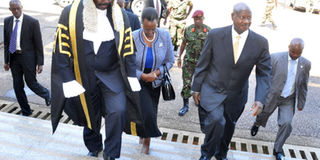Museveni hits back at MPs in oil Bill row

President Museveni, his wife Janet and Deputy Speaker of Parliament Jacob Oulanyah walk to the Chamber yesterday . PHOTO BY GEOFFREY SSERUYANGE
What you need to know:
Standoff. Opposition legislators in boycott of President’s address
President Museveni returned from Russia, not with love, but with a fully loaded verbal Kalashnikov rifle, hitting back at independent-minded MPs and civil society groups over criticism of the country’s oil laws.
Mr Museveni told a special sitting of Parliament yesterday that civil society groups and the MPs who unsuccessfully opposed certain clauses of the recently passed Petroleum Exploration and Development Bill, 2012, were undermining Uganda’s interests on behalf of foreign interests.
The President did not name the foreign interests, but singled out MPs Theodore Ssekikuubo (NRM, Lwemiyaga), Winfred Niwagaba (NRM, Ndorwa East), Abdul Katuntu [FDC, Bugweri] and civil society groups, including the Advocates Coalition for Development and Environment, Acode, for representing the interests in the matter.
Acting under the Parliamentary Forum on Oil and Gas, the MPs and civil society groups organised several workshops for MPs to educate them about different clauses of the Bill, including the controversial clause nine, which gives the minister authority to grant and revoke licences, negotiate and endorse petroleum agreements.
The President accused the groups, which wanted the responsibility to go to the Petroleum Authority, of trying to bypass the oil and gas experts in the ministry in the interest of their foreign backers.
The President told MPs that Acode spent Shs1.5 billion on one of many workshops, where “some of the leaders in the politics of Uganda” were paid Shs1 million each and facilitators, Shs5 million.
“Where is that money coming from and for what purpose?” President Museveni asked, revealing that he had written to the Inspector General of Government over the matter, ostensibly to encourage the office to investigate the assets and liabilities of the officials and whether they had declared the income.
In a wide-ranging speech on the country’s oil and gas sector, President Museveni revealed, for the first time in public, the political considerations behind some of the licensing decisions in the sector.
He rsaid the government had chosen China’s CNOOC over Italy’s Eni because of the former’s more significant geopolitical influence. Companies from countries that are hostile to Uganda will not be allowed into the oil and gas sector, Mr Museveni said.
The President restated that the country would build a domestic oil refinery despite misgivings by the foreign oil companies about its viability. He also revealed that he had ordered against the export of any of the country’s uranium deposits until there is domestic capacity to use them to generate nuclear electricity.
Mr Museveni said the next “battle” will be between him and the political class of Ugandans who want to use oil money for salaries, consumption expenses such as buying Whisky, cars, wigs, perfumes and artificial bums. He added that the money from oil should be used for creating durable capacity for the future of the country.




